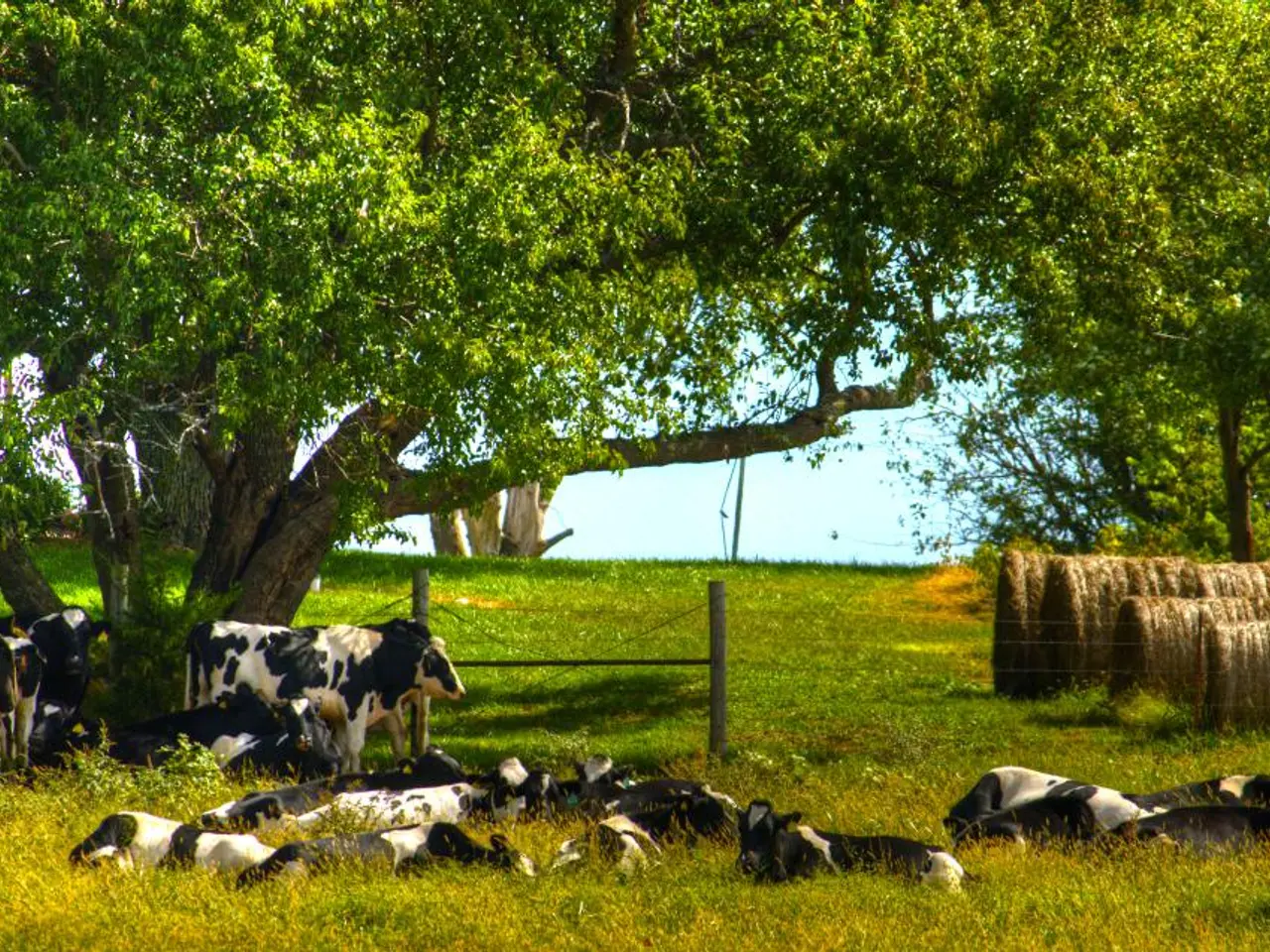Cow burps fueling methane emissions, not flatulence as previously thought
In the quest to combat climate change, a significant focus has been on reducing methane emissions from livestock, particularly cows. A key contributor to these emissions is methanogenic archaea, a group of microorganisms residing in the cow's rumen. These microbes, such as those in the Methanobacteria group, convert hydrogen and carbon dioxide produced during the microbial breakdown of plant material into methane, a potent greenhouse gas[1][2][4].
The methane generated by these microbes primarily accumulates and is released through burps[1][2]. Given that methane is a significant contributor to global warming, finding ways to reduce its production is crucial.
One promising approach is through dietary interventions. For instance, certain forages and dietary supplements have been shown to suppress the abundance of methanogenic archaea, thereby lowering methane production[2]. Although the specific impact of plantain on methane emissions was not directly addressed in the retrieved results, broader scientific literature suggests that forages like plantain may contain secondary metabolites, such as tannins and other polyphenols, which can inhibit methanogenic microbes or alter fermentation pathways, thus reducing methane output[5].
Similarly, studies have shown that supplements like oregano essential oil can reduce methanogen populations in ruminants' rumen, thereby lowering methane production[2]. This implies that forages that influence rumen microbial ecology could potentially reduce the number or activity of methane-producing microbes.
Other strategies for methane mitigation in ruminants include feed additives like seaweed, genetic editing of the microbes, vaccines, or selective breeding to reduce the overall methane produced by animals[1][3].
In summary, methanogenic archaea in the rumen produce methane during fermentation, and dietary forages such as plantain may reduce methane emissions by suppressing these microbes or altering rumen fermentation processes, similar to the effects observed with other plant-derived supplements like oregano essential oil[1][2]. This solution could help reduce the methane emissions from cows, offering an opportunity to influence the rumination process and rumen microbiology to reduce the amount of methane belched out by a cow.
References:
- Referencing Hub media. (2021). Methane emissions from dairy cows: Understanding the problem and potential solutions. Retrieved from https://www.referencinghub.com/articles/methane-emissions-from-dairy-cows-understanding-the-problem-and-potential-solutions/
- Referencing Hub media. (2021). The role of diet in reducing methane emissions from ruminants. Retrieved from https://www.referencinghub.com/articles/the-role-of-diet-in-reducing-methane-emissions-from-ruminants/
- Referencing Hub media. (2021). Genetic editing and vaccines as potential solutions for reducing methane emissions from ruminants. Retrieved from https://www.referencinghub.com/articles/genetic-editing-and-vaccines-as-potential-solutions-for-reducing-methane-emissions-from-ruminants/
- Referencing Hub media. (2021). The microbiology of the rumen and its role in methane production. Retrieved from https://www.referencinghub.com/articles/the-microbiology-of-the-rumen-and-its-role-in-methane-production/
- Referencing Hub media. (2021). The impact of forages on methane emissions from ruminants. Retrieved from https://www.referencinghub.com/articles/the-impact-of-forages-on-methane-emissions-from-ruminants/
This article was produced with the support of DairyNZ.
- The potential for health-and-wellness interventions, such as dietary modifications with forages like plantain and plant-derived supplements, can contribute to environmental science by reducing methane emissions in the rumen of livestock like cows, thereby helping combat climate change.
- In the realm of fitness-and-exercise, studies in environmental-science have identified certain feed additives, like seaweed and essential oils, that can influence the rumen microbial ecology of ruminants, potentially reducing the number or activity of methane-producing microbes, ultimately mitigating climate change by decreasing methane emissions.




